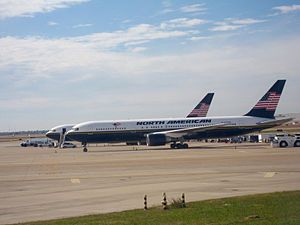Last week, the Cranky Flier, in an article on CNN entitled “This isn’t the Airline I signed up for”, Â covered the issues of codesharing. Namely…
People often don’t realize what airline they are actually flying on…
We put that in bold letters, because it is a big issue. This leads to other issues, such as conflicting rules, and before long, the passenger trying to figure out what rules are applicable to them is bounced back and forth like a ping pong ball.
We recall a story a former crew scheduler for North American Airlines told us some years back. North American was contracted to El Al to provide connecting service from New York to Los Angeles. When people arrived in New York, many refused to transfer once they saw it was not an El Al plane.
Let’s define the term for a moment. A codeshare agreement is where an airline(marketing carrier) designates its own flight number on the flight of another airline(operating carrier) and sells it as its own. Â Some codeshare flights are limited to connecting traffic only, and some allow you to buy a ticket on a marketing carrier that doesn’t actually include a single flight actually operated by them.
We think the whole codesharing mess should be eliminated, not that it is likely to. Airlines can still make their presence known in various cities without actually flying there. If the issue is fares, airlines can file fares that include a segment on another carrier. In a codeshare agreement, the operating carrier’s inventory is mapped onto the fare platform of the marketing carrier in order to produce inventory for the codeshare flight. This often results in the marketing carrier underselling the operating carrier on their own aircraft.
Back to the pricing issue. There are other options. For one, as mentioned, an airline can still have a single fare that includes a segment on another carrier. Airlines negotiate interline agreements that include this. But it means, for each fare they sell that includes a segment on another carrier, the other carrier gets a defined percentage, which can eat into profits. There is also the option of using a sum of sector principle…namely, selling each airline’s flight at market rate, or, if not at market rate, setting up private fares for the marketing carrier that they agree by contract can only be purchased as part of a connecting trip.
To do this, airlines would just have to agree on a combined set of rules for common passenger issues. There is a principle for this in the industry. The most restrictive rule principle. Namely, if Airline A has a $50 change fee and Airline B has a $150 change fee, the change fee is $150. This spring, IATA entered in IATA Resolution 302, which airlines seem not to have adopted in our experience. Resolution 302 notes that baggage allowances/restrictions for multi-carrier itineraries will be those of the most significant carrier(MSC).
The only exception to our above thought are the regional carriers. If an airline does not operate under its own name, and agrees to adopt the principles, rules, and obligations of the marketing carrier, then we do not object to codesharing. But each flight should be marketed under a single name and number. Look at how confusing it is without it.
We welcome comments on this.
- Do you think airlines can do just fine with interline agreements and do not need codesharing agreements?
- Do you think codesharing provides benefit for the consumer?
- Do you think airlines should be forced to clarify and unify rules for codeshare passengers?
Related articles
- This isn’t the airline I signed up for (cnn.com)

